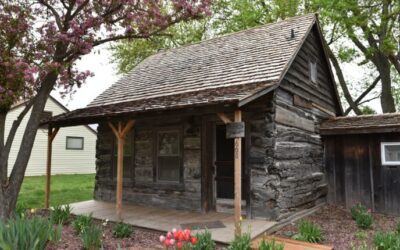
In Sept. 2020, the median home sale price in Iowa was $188,500. As of Sept. 2023, that figure had risen to $229,600, a 21% increase, according to Redfin. Renters are also paying more in Iowa. They paid an average of $947.54 between January and March 2020. Now, they’re paying $1,085.55, a $138.01 increase. (AP Photo/Andrew Harnik)
The Biden administration announced last week that it’s launching a multi-agency effort to ensure access to affordable housing, introducing a slew of resources to help convert high-vacancy commercial buildings to residential use.
The White House says these efforts are an attempt to create “much-needed housing that is affordable, energy efficient, near transit and good jobs, and reduce greenhouse gas emissions.”
Specifically, the administration is supporting the conversion of high-vacancy commercial buildings to residential use through new financing, technical assistance, and sale of federal properties. The goal is to create more affordable housing closer to transit in many communities across the country.
These efforts come as housing and rental prices have soared in recent years. Mortgage rates are nearing 8% and with steadily rising home prices and the lowest inventory of homes for sale in over a decade, the housing market is increasingly pricing out working and middle-class families.
In Sept. 2020, the median home sale price in Iowa was $188,500. As of Sept. 2023, that figure had risen to $229,600, a 21% increase, according to Redfin. Renters are also paying more in Iowa. They paid an average of $947.54 between January and March 2020. Now, they’re paying $1,085.55, a $138.01 increase. These figures are in line with a national trend that’s shown rising home and rent prices since the beginning of the pandemic.
As part of last week’s announcement, the US Department of Transportation (DOT) will release new guidance on more than $35 billion in lending available for efforts to boost housing supply near public transit and improve local zoning and land use laws.
The DOT will also release guidance that will make it easier for both local and municipal transit agencies across the country to transfer and repurpose existing structures and properties, “for transit-oriented development and affordable housing projects, including conversions near transit.”
The idea of converting empty commercial or public buildings into residential real estate is one that has gotten increasing attention in recent years, as America’s housing crisis has worsened.
Transportation Secretary Pete Buttigieg told reporters on a call last week that these newly-launched programs will build on existing conversion projects, “helping to advance those efforts to increase housing supplies and reduce housing costs.”
“The pandemic really changed the patterns of how many Americans work and live and commute, and right now, across the country, we’re seeing decades-high levels of office vacancies in many downtowns, while at the same time, many of America’s cities and towns face a steep shortage of housing, and families are struggling to afford housing and transportation,” he said.
The Department of Housing and Urban Development (HUD) will also have a hand in this latest effort from the Biden administration—it will release an updated notice detailing how its Community Development Block Grant fund can be used to boost housing supply. These grants support community development by addressing infrastructure needs, economic development projects, public facilities installation, housing rehabilitation, and more.
According to the White House, projects that qualify for these grants include those focused on the “acquisition, rehabilitation, and conversion of commercial properties to residential uses and mixed-use development.”
HUD will begin accepting applications for $85 million in funding through its Pathways to Removing Obstacles to Housing program, which makes money available to adapt buildings and finance conversions.
In its announcement, the Biden administration also released a Commercial to Residential Federal Resources Guidebook, detailing over 20 federal programs across six federal agencies with eligible resources for converting existing properties into living spaces.

10 best books set in Iowa
Discover the 10 best books set in Iowa, capturing the essence of its heartland charm, rural landscapes, and unforgettable stories. Author Jhumpa...

Cornhole Champions #1 – Recounting the count
Iowa Democrats didn't exactly get points on the board in 2024. But it's not all bad news. Toss the bags with us as we get a temperature check on...

The deadliest natural disasters in Iowa history
Iowans are no stranger to severe weather. Learn more about some of Iowa’s deadliest natural disasters, from floods and tornadoes to droughts and...

Iowa towns named after famous places
Hit the road and check out these Iowa towns that may or may not be mistaken for popular cities around the world. Iowa may be smack dab in the middle...

What to know about Labor Day and its history
By JAMIE STENGLE Associated Press DALLAS (AP) — From barbecues to getaways to shopping the sales, many people across the U.S. mark Labor Day — the...

The fascinating story behind Lake Sugema’s name
Learn about Lake Sugema, from its history and how it was named to the wildlife that calls it home. What began as a project to prevent soil loss,...




